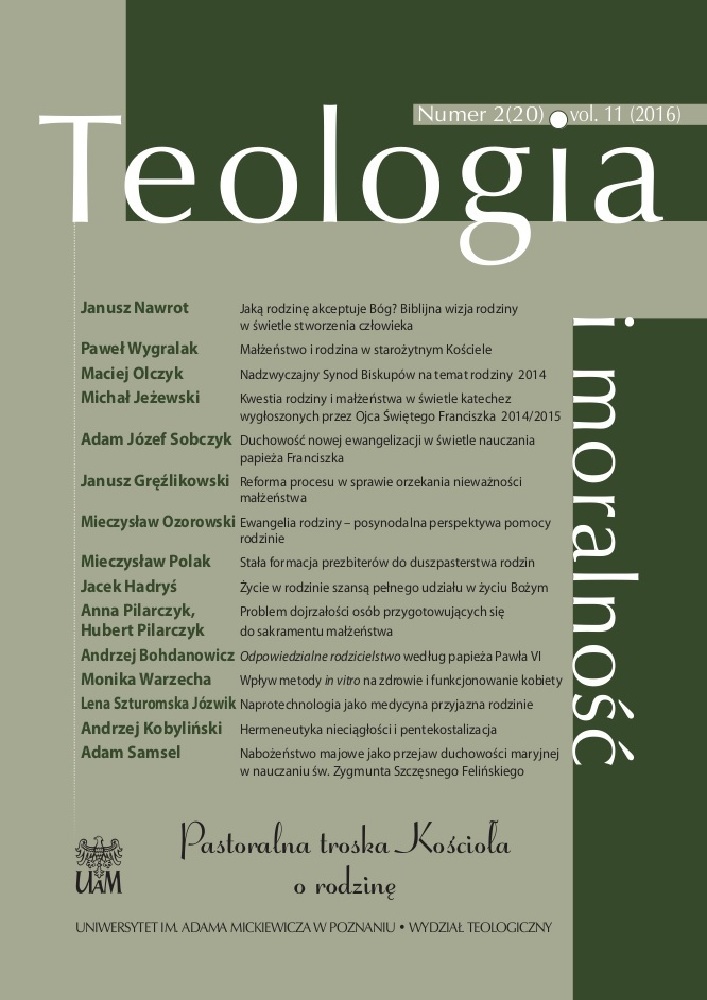Abstract
The reform of a process on the recognition of nullity of marriage, contained in the motu proprio Mitis Iudex Dominus Iesus of Pope Francis, clearly fits the new evangelization and it is, in relation to marriage and family, an important legal and pastoral element. Through the reform of canon marriage process the new evangelization gets even more power and a new spirit. It is also an expression of concern of the supreme legislator in the Church for spiritual good of divorced and remarried spouses who wish to regularize their marital status in the Church, and thus learn the truth about their marriage. They - as poor, or divorced - were put in the center of the reform of the process on the recognition of nullity of marriage. The Pope promulgating the new canonical procedural law relating to nullity of marriage follows the principle salus animarum suprema lex (can. 1572), which has always accompanied the Church and mainly into consideration salvation of souls. This important and fundamental principle of church law is implemented in specific regulations of the reformed process in which the faithful and their spiritual well-being seem to be paramount. The reform and new regulations of the Pope Francis go in this direction to simplify judicial procedures and thus speed up the processes on nullity of marriage, in order to serve the divorced and the remarried. The changes are also designed to facilitate contact between the faithful and church tribunals, which in turn is expected to contribute to solve a problem of conscience which makes life difficult for many people. As the Pope emphasizes, the changes introduced do not breach the principle of the indissolubility of marriage. On the contrary, this principle is juxtaposed with specific cases of invalid marriages. Conducting the process on nullity of marriage should take place in full respect of the nature of marriage, which is to respect the truth. The quest for it guarantees fair judgment, which becomes the realization of the law of love. The new rules, to bring the expected results, to meet its objectives, and to be introduced and applied in truth and justice, require a comprehensive, critical "consideratin" on the current functioning of the Church judiciary and openness to novelty they bring. Moreover, they need freedom of heart and mind of bishops, in a sign of collegiality - not in principle, but real, as well as new legal and pastoral structures (legal and family clinics), and also a change of mentality in the approach to the issues and problems of ecclesiastical judiciary system of diocesan bishops and employees of the Church judiciary.
References
Benedictus XIV, Constitutio Dei miseratione (03.11.1741), w: Codicis Iuris Canonici Fontes, t. I, ed. P. Gasparri, Romae 1923, s. 695-701.
Canones et Decreta Concilii Tridentini ex editione Romana A. MDCCCXXXIV. Repetiti. Accedunt S. Congr. Card. Conc. Trid. Interpretum Declarationes ac Resolutiones ex ipso resolutionum thesuaro Bullario Romano et Benedicti XIV. S.P. Operibus et Constitutiones Pontificiae Recentiores ad jus commune spectantes e bullario Romano selectae. Assumpto Socio Friderico Schulte J.U.D. Guestphalo edidit Aemilius Ludovicus Richter J.U.D. Et in Lit. Univ. Berol. Prof. Publ. Ord., Lipsiae 1853.
Codex Iuris Canonici. Auctoritate Ioannis Pauli pp. II promulgatus. Kodeks Prawa kanonicznego. Przekład polski zatwierdzony przez Konferencję Episkopatu, Poznań: Pallottinum 1984.
Codex Iuris Canonici. Pii X Pontificis Maximi iussu digestus. Benedicti Papae XV auctoritate promulgatus, red. P. Gasparri, Romae 1934.
Decretalium Collectiones […] editio Lipsiensis secunda post Aemilii Ludouici Richteri curas ad librorum manu scriptorium et editionis Romae fidem recognovit et adnotatione critica instruxit Aemilius Friedberg, Ex Officina Bernhardi Tauchnitz, Lipsiae MDCCCLXXXI.
Komentarz do Instrukcji procesowej „Dignitas connubii”, red. T. Rozkrut, Sandomierz 2007.
Papież Franciszek, bulla ustanawiająca nadzwyczajny Jubileusz Miłosierdzia Misericordiae vultus (11.04.2015), „Miesięcznik Diecezji Włocławskiej – Kronika” 98(2015), nr 5, s. 489-508.
Papież Franciszek, list apostolski motu proprio Mitis Iudex Dominus Iesus, reformujący kanony Kodeksu prawa kanonicznego dotyczące spraw o orzeczenie nieważności małżeństwa; List apostolski Mitis et misericors Iesus, reformujący kanony Kodeksu kanonów kościołów wschodnich dotyczące spraw o orzeczenie nieważności małżeństwa (tekst łacińsko-polski), Tarnów 2015.
Paulus VI, Constitutio apostolica Regimini Ecclesiae universae (15.08.1967), AAS 59(1967), s. 885-928.
Paulus VI, Litterae apostolacie motu proprio datae quibus normae quaedam statuuntur ad processus matrimoniales expeditus absolvendos (28.03.1971), AAS 63(1971), s. 441-446.
Pius X, Constitutio apostolica Sapienti Consilio (29.06.1908), AAS 1(1909), s. 9-135.
Pontificium Concilium de Legum Textibus, Instructio servanda a tribunalibus dioecesanis et interdioecesanis in pertractandis causis nullitatis matrimonii “Dignitas connubii”, Libreria Editrice Vaticana 2005.
S. Congregatio pro Sacramentis, Instructio servanda a tribunalibus dioecesanis in pertractandis causis de nullitate matrimoniorum (15.08.1936), AAS 28(1936), s. 313-362.
Literatura
Góralski W., Uprawnienia udzielone trybunałom kościelnym Belgii oraz Anglii i Walii w zakresie procesu małżeńskiego, „Prawo Kanoniczne” 17(1974), nr 3-4, s. 107-115.
Góralski W., Wprowadzenie do motu proprio „Mitis Iudex Dominus Iesus”, w: Proces małżeński według motu proprio Mitis Iudex Dominus Jesus, red. J. Krajczyński, Płock 2015, s. 7-21.
Greszta-Telusiewicz M., Processus brevior, w: Proces małżeński według motu proprio Mitis Iudex Dominus Iesus, red. J. Krajczyński, Płock 2015, s. 75-92.
Leszczyński G., Założenia ogólne motu proprio Mitis Iudex Dominus Iesus, w: Proces małżeński według motu proprio Mitis Iudex Dominus Iesus, red. J. Krajczyński, Płock 2015, s. 23-36.
Pawluk T., Prawo kanoniczne według Kodeksu Jana Pawła II, t. IV: Dobra doczesne Kościoła, Sankcje w Kościele, Procesy, Olsztyn 1990.
Pawluk T., Reforma kanonicznego procesu małżeńskiego w świetle motu proprio „Causas matrimoniales”, „Prawo Kanoniczne” 16(1973), nr 3-4, s. 242-254.
Pieronek T., Normy postępowania w sprawach małżeńskich wydane przez Stolicę Apostolską dla diecezji Stanów Zjednoczonych, „Prawo Kanoniczne” 16(1973), nr 1-2, s. 177-204.
Pinto P.V., Reforma procesu w sprawie orzekania nieważności małżeństwa, „L’Osservatore Romano” (ed. polska), 36(2015), nr 11, s. 44-46.
Przybyła A., Prawo kanoniczne w świetle obrad Synodu Biskupów, „Ateneum Kapłańskie” 71(1968), s. 157-168.
Sobański R., Między rygoryzmem a laksyzmem. Kanoniczny proces o nieważność małżeństwa na tle kondycji małżeństw sakramentalnych w Polsce, „Prawo Kanoniczne” 53(2010), nr 3-4, s. 161-169.
License

This work is licensed under a Creative Commons Attribution-NoDerivatives 4.0 International License.
